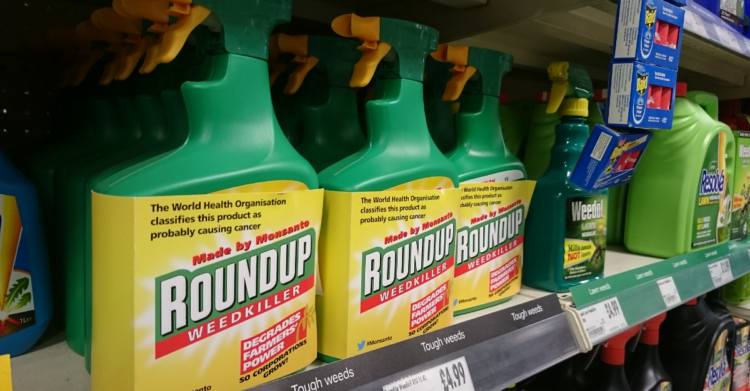I’m sure you’ve heard the latest worries regarding the popular weed killer Roundup, and claims that the product’s main ingredient, glyphosate, causes cancer.
People have called for the Trump Administration to mandate new warning labels on the product, however a new statement from the EPA indicates that they are choosing to do the opposite.
In the statement, they say that they will no longer approve labels containing the cancer risk claims.
“EPA will no longer approve product labels claiming glyphosate is known to cause cancer – a false claim that does not meet the labeling requirements of the Federal Insecticide, Fungicide, and Rodenticide Act (FIFRA).”
In particular, they call out California’s labeling practices.

“The State of California’s much criticized Proposition 65 has led to misleading labeling requirements for products, like glyphosate, because it misinforms the public about the risks they are facing.”
I’m sure you’ve seen the “known to cause cancer in the State of California” labels on products. This is why, and it’s been controversial ever since.
Proposition 65 was passed in 1986 and changes the requirements for warning labels.

If a product contains a carcinogen in quantities that would amount to more than a “1-in-100,000 risk of cancer assuming lifetime exposure” then the warning must be on the packaging.
But opponents of Prop 65 worry that adhering to it leads to vague warnings that can do more harm than good.

Are you going to get a lifetime of exposure to a carcinogen by visiting Disneyland because there may happen to be cadmium pigments in their painted signs or gasoline powering their landscaping vehicles?
No, but using the words “cancer” or “birth defects” can create just enough confusion to worry mainstream moms and dads who just want to take their kids to a theme park.
Due to the large population of California and its ability to push cultural trends, the EPA has allowed things to get by.

But when they feel that the warning has been falsely attached to a specific chemical, they take a closer look. Which is what happened with Roundup and other products containing glyphosate.
“It is irresponsible to require labels on products that are inaccurate when EPA knows the product does not pose a cancer risk. We will not allow California’s flawed program to dictate federal policy.”
After high profile legal cases brought the product back into the limelight, the EPA launched a full review of the chemical.

They found that “glyphosate is not a carcinogen, and there are no risks to public health when glyphosate is used in accordance with its current label,” and noted that many other organizations around the world have reached similar conclusions.
And that’s true.

For example, Health Canada completed a review of glyphosate in 2017, deeming it safe to use. But after those same American lawsuits, they were pressured to look again and brought in 20 new scientists to look over the data.
In February 2019, they announced that the second group had reviewed more than 1,300 and concluded that there was no cancer risk.
California says that the chemical is included because of its classification by the International Agency for Research on Cancer (IARC).

It’s included in Group 2A, or “probable carcinogens.”
Which sounds scary, except that things like wood smoke, red meat, and coffee are also classified in that same group.
So what comes next?

Monsanto, who owns the Roundup brand, is suing to block California from forcing the warning label on their products. While the lawsuit moves through the courts, a federal judge has instituted a measure to prevent the state from enforcing the labels.
h/t: CBS News

















































